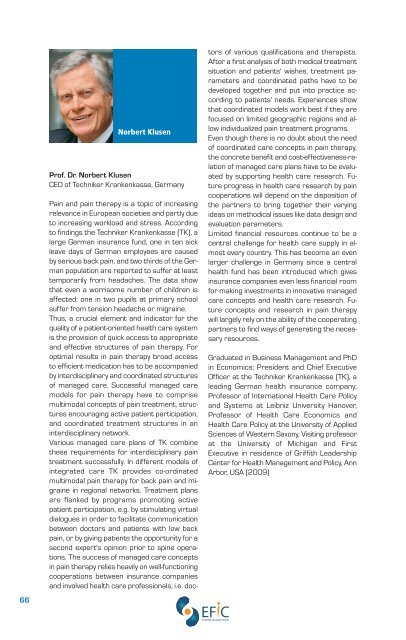First EFIC® Symposium Societal Impact of Pain - SIP
First EFIC® Symposium Societal Impact of Pain - SIP
First EFIC® Symposium Societal Impact of Pain - SIP
Create successful ePaper yourself
Turn your PDF publications into a flip-book with our unique Google optimized e-Paper software.
66<br />
Norbert Klusen<br />
Pr<strong>of</strong>. Dr. Norbert Klusen<br />
CEO <strong>of</strong> Techniker Krankenkasse, Germany<br />
<strong>Pain</strong> and pain therapy is a topic <strong>of</strong> increasing<br />
relevance in European societies and partly due<br />
to increasing workload and stress. According<br />
to findings the Techniker Krankenkasse (TK), a<br />
large German insurance fund, one in ten sick<br />
leave days <strong>of</strong> German employees are caused<br />
by serious back pain, and two thirds <strong>of</strong> the German<br />
population are reported to suffer at least<br />
temporarily from headaches. The data show<br />
that even a worrisome number <strong>of</strong> children is<br />
affected: one in two pupils at primary school<br />
suffer from tension headache or migraine.<br />
Thus, a crucial element and indicator for the<br />
quality <strong>of</strong> a patient-oriented health care system<br />
is the provision <strong>of</strong> quick access to appropriate<br />
and effective structures <strong>of</strong> pain therapy. For<br />
optimal results in pain therapy broad access<br />
to efficient medication has to be accompanied<br />
by interdisciplinary and coordinated structures<br />
<strong>of</strong> managed care. Successful managed care<br />
models for pain therapy have to comprise<br />
multimodal concepts <strong>of</strong> pain treatment, structures<br />
encouraging active patient participation,<br />
and coordinated treatment structures in an<br />
interdisciplinary network.<br />
Various managed care plans <strong>of</strong> TK combine<br />
these requirements for interdisciplinary pain<br />
treatment successfully. In different models <strong>of</strong><br />
integrated care TK provides co-ordinated<br />
multimodal pain therapy for back pain and migraine<br />
in regional networks. Treatment plans<br />
are flanked by programs promoting active<br />
patient participation, e.g. by stimulating virtual<br />
dialogues in order to facilitate communication<br />
between doctors and patients with low back<br />
pain, or by giving patients the opportunity for a<br />
second expert's opinion prior to spine operations.<br />
The success <strong>of</strong> managed care concepts<br />
in pain therapy relies heavily on well-functioning<br />
cooperations between insurance companies<br />
and involved health care pr<strong>of</strong>essionals, i.e. doc-<br />
tors <strong>of</strong> various qualifications and therapists.<br />
After a first analysis <strong>of</strong> both medical treatment<br />
situation and patients' wishes, treatment parameters<br />
and coordinated paths have to be<br />
developed together and put into practice according<br />
to patients' needs. Experiences show<br />
that coordinated models work best if they are<br />
focused on limited geographic regions and allow<br />
individualized pain treatment programs.<br />
Even though there is no doubt about the need<br />
<strong>of</strong> coordinated care concepts in pain therapy,<br />
the concrete benefit and cost-effectiveness-relation<br />
<strong>of</strong> managed care plans have to be evaluated<br />
by supporting health care research. Future<br />
progress in health care research by pain<br />
cooperations will depend on the disposition <strong>of</strong><br />
the partners to bring together their varying<br />
ideas on methodical issues like data design and<br />
evaluation parameters.<br />
Limited financial resources continue to be a<br />
central challenge for health care supply in almost<br />
every country. This has become an even<br />
larger challenge in Germany since a central<br />
health fund has been introduced which gives<br />
insurance companies even less financial room<br />
for making investments in innovative managed<br />
care concepts and health care research. Future<br />
concepts and research in pain therapy<br />
will largely rely on the ability <strong>of</strong> the cooperating<br />
partners to find ways <strong>of</strong> generating the necessary<br />
resources.<br />
Graduated in Business Management and PhD<br />
in Economics; President and Chief Executive<br />
Officer at the Techniker Krankenkasse (TK), a<br />
leading German health insurance company;<br />
Pr<strong>of</strong>essor <strong>of</strong> International Health Care Policy<br />
and Systems at Leibniz University Hanover,<br />
Pr<strong>of</strong>essor <strong>of</strong> Health Care Economics and<br />
Health Care Policy at the University <strong>of</strong> Applied<br />
Sciences <strong>of</strong> Western Saxony, Visiting pr<strong>of</strong>essor<br />
at the University <strong>of</strong> Michigan and <strong>First</strong><br />
Executive in residence <strong>of</strong> Griffith Leadership<br />
Center for Health Management and Policy, Ann<br />
Arbor, USA (2009)






